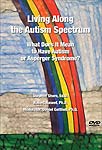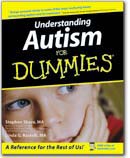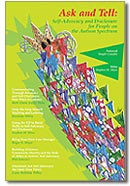 |
 |
 |
||
|
|
|
|||
|
NewsPrepared
Testimony Before the House Committee on Government Reform
|
|
Asperger’s Association of New England |
|
Autism Society of America |
|
|
|
|
Introduction
Mr. Chairman. I would like to thank you and your colleagues on the Committee on Government Reform for this opportunity to present testimony on the issue of autism.
I am Stephen Shore and reside in Brookline, Massachusetts with my wife Yi Liu where I am completing a doctoral degree in special education from Boston University with an emphasis on helping those with autism reach their fullest potential. I am the author of Beyond the Wall: Personal Experiences with Autism and Asperger Syndrome, present and consult internationally for autism-related issues, teach college-level courses in special education at both Boston University and Lesley University, and work with people on the autism spectrum. I am very fortunate to be leading a fulfilling and productive life.
Most of us here today have involuntarily been inducted into this community by the autism bomb. What happens? A child is born and develops typically until 18-24 months. Suddenly, hit with a bomb that spreads its shrapnel from the child, to the family, to education, the community, and humanity at large, the child loses verbal ability. Withdrawal from the environment occurs. There is often self-abusive and self-stimulatory behaviors. Tantrums.
I was hit with the autism bomb at age 18 months. Loss of verbal communication, lack of body to environmental relationship, tantrums, head banging, self-stimulatory behaviors.
Despite a claim being "too sick" to work with and recommendations for institutionalization by diagnosing professionals, my parents were left to provide the needed early intervention at a time when the term had yet to be conceived. My parents had no support. Yet fortunately, my mother was able to stay home all day and provide the equivalent of what is known today as home-based early intervention. Rather than let me spend my time exhibiting autistic behaviors, my mother emphasized music, movement, sensory integration, narration, and imitation to at first make me aware of her existence, and then coax me into her world. I was very lucky.
At this time, I stand before you as I continue my quest to help those with autism spectrum disorder lead fulfilling and productive lives. I continue to struggle with the residuals of autism. While the uniform of a suit and tie may be a mere inconvenience to most people, it is a major sensory violation to me. But helping my peers on the autism spectrum is more important than my discomfort. I am very lucky and am the rare exception of a child with an early autism spectrum diagnosis.
Here, in the United States of America, currently the wealthiest nation on Earth, everyone on the autism spectrum has a right under IDEA to receive critical services throughout their lifespan tailored to their needs. This should not be a matter of luck or debate but a question of how.
Observations
What about those less fortunate children and adults who are not receiving needed intervention and assistance to successfully navigate their environment? As Board President of the Asperger's Association of New England, Board Member of the Autism Society of America, and board member of other national autism-related organizations, I see many others with Autism Spectrum Disorder (ASD) who are vastly underserved. Toddlers not receiving vitally needed early intervention and school-aged children in need of professionals educated in how to interact with those on the autism spectrum.
We desperately need more educational research. To date, we know very little about the interventions that are effective with individuals with high functioning autism and Asperger Syndrome. The implications of that are enormous. I see so many of my peers living far below their potential. Homelessness and other substandard living conditions, unemployment and serious underemployment are all too common. People with HFA and AS have not been taught to interact successfully with the environment and people around them.
Until medical technology can answer the questions it is pursuing, we have thousands of individuals who are exposed to educational interventions that are not validated or, perhaps even more tragic, not exposed to interventions because the educational community does not know what to do. There is some literature that supports best practice for children and youth with moderate to severe autism spectrum disorders, but the same cannot be said for individuals with high functioning autism and Asperger Syndrome. We need to look at academic, cognitive, developmental, behaviorial, social, sensory, and other interventions. Due to the vast diversity in people with autism, there is no one methodological approach that suits all children. The intervention must be tailored to fit the person's particular needs. If the CDC estimates one out of 250 kids have autism right now, they need to consider that in 10-15 years one out of 250 ADULTS will have autism, and then what will we do? Funds devoted to research and early intervention now will pay huge dividends later.
And what about adults with High Functioning Autism (HFA) and Asperger Syndrome (AS)?
We also need to look at the plight of adults with Asperger Syndrome and high functioning autism. There is very little literature on this population also. Generally adults with HFA and AS do not have access to community supports because of their IQ, but don't have the skills to live independently or to seek and/or keep jobs even though they have university degrees. In the commonwealth of Massachusetts, persons with high functioning autism and Asperger Syndrome fall in the cracks between the Department of Mental Retardation (IQ is too high) and Department of Mental Health (HFA and AS are not mental disorders). Similar situations exist in many other states too.
In addition, there is a large number of adults who want to access universities but need a myriad of supports to be successfully. We need a study of these individuals and supports needed relative to these three topics.
We also need more effort placed on teacher training so that those who educate children and youth with ASD understand ASD, can translate research to practice, and document child progress.
What I have described above is a national emergency. Between 2 and 6 per 1,000 individuals are estimated to have autism, according to the Centers for Disease Control and Prevention. This means that some 500,000 to 1,500,000 individuals in the U.S. have autism today, and the numbers are rising. Based on reports by the U.S. Department of Education, the California Department of Developmental Services, and others, ASA estimates autism is growing at a rate of 10 to 17 percent annually. If these rates continue, ASA estimates that the number of individuals with autism could increase by 100 to 400 percent over the next 10 years. According the MIND institute, the conservative cost of a lifetime of care (including only transportation, day services, and residential care) for every person with autism in California's developmental services system is $2 million according to the California Department of Developmental Services. That $2 million staggers the mind when multiplied by the number of individuals with autism in the U.S. And this raw dollar amount does not even begin to express the opportunity cost of lost wages and other contributions to society such as charitable work and playing in musical ensembles.
Every one of these persons must be given the same chance that only a select few due to luck have had to succeed in life.
Recommendations
I'd like to close with several concrete recommendations:
-
Work with the Autism Society of America by supporting their funding requests and in developing legislation regarding the autism spectrum as well as implementation of the National Research Council's "Educating Children with Autism" report recommendations.
-
Immediate and abundant funding for research and education of those who work with people having autism.
-
Fund fellowships to increase the number of skilled medical doctors, teachers, and other professionals in working with people on the autism spectrum.
-
Mainstream autism as it relates to insurance payments. It is a medical neurobiological condition (not a psychiatric one) and should not be constrained by policy limits on mental health coverage.
-
Standardize payments for recognized methods of interventions across the country. It is unfair that some families are on waiting lists for two years to access coverage. No one particular approach can be required because different children respond to different methodologies. Some sound approaches include but are not limited to the Miller Method, Floortime, Higashi, TEACCH, and ABA.
Summary:
While we do have some good interventions and treatments for autism in place at this time, it is a travesty that the quantity and quality of these services are lacking. The NIH needs to work with organizations such as the Autism Society of America in developing national policy for people within the autism community so that all those having autism have as fair a shot at leading fulfilling, productive, and independent lives to the limits of their capacities.
Mr. Chairman and members of the Committee on Government Reform. Your providing this historical opportunity to present testimony on the issue of autism today is very much appreciated. I know you will do the right thing. Thank you.
Biography of Stephen Shore | Writings | Links | FAQ | Contact Stephen Shore | Home



